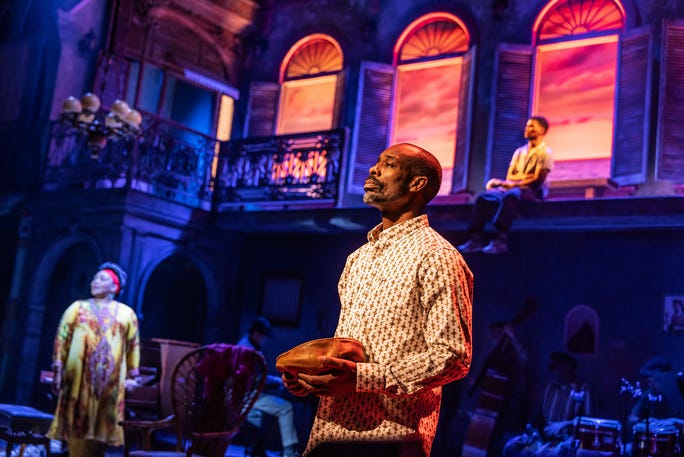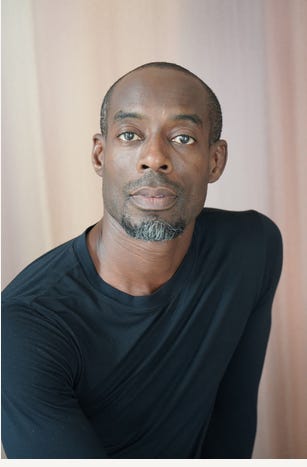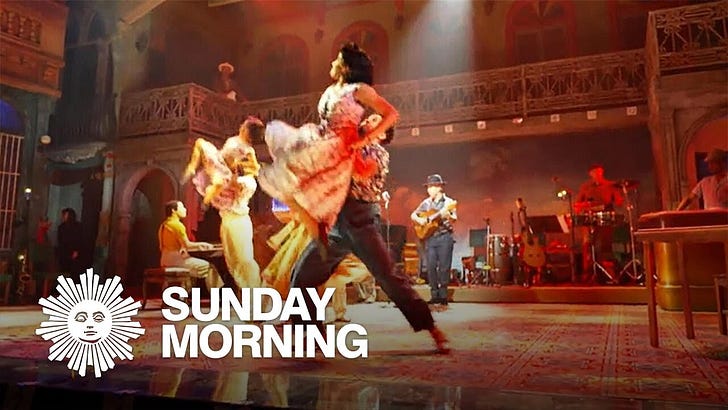In His First Acting Role, Mel Semé is the Buena Vista Social Club's Ibrahim Ferrer
He never saw a Broadway show. Now he stars in one.

When Mel Semé was cast to play the part of an elder Ibrahim Ferrer in the musical inspired by the Buena Vista Social Club album, which is now playing on Broadway, he had never seen a Broadway show. When he got the call to audition, the singer and multi-instrumentalist was in Barcelona, where he had been living for twenty years. That’s where he had been making his name as a singer-songwriter in small clubs around town, and where I first heard his name a half a dozen years ago from friends who told me he was an artist to watch. I finally caught up with Mel on Zoom last week. He spoke to me from his temporary home in New Jersey, just across the river from Manhattan’s theater district.
Judy Cantor-Navas: How did you get from Barcelona to Broadway?
Mel Semé: It’s not a hundred percent clear to me. I received an email from a casting company in New York and they told me about this project for the Buena Vista musical when they were putting it together to perform at the Atlantic Theater [Off Broadway]. At first I told them, ‘Listen, this is very interesting and a grew up in Cuba and it would be so great to play the music that I grew up listening to. But I’m so busy, I’m touring all the time, I have no acting training and I live in Spain.’ I sent them my touring schedule and they said, ‘If you would be willing to try it, we’d be happy to hire you.´ I was a little bit skeptical about music from Buena Vista Social Club being produced in New York by an American company. I was like, I don’t know what these people are going to do with this. I don’t know if I want to be part of something that is more like a clown version of Buena Vista. There was a workshop, and I came to see what it was about. And I was blown away.
I’m a fan of West Side Story in general, the music, but also the Spielberg movie. I’ve seen it like ten times. And so when I got to the workshop and I see Justin Peck there, who was the choreographer for the movie, and then 90 percent of the dancers who have been dancing in the movie, I was like, ‘oh my god it looks like I definitely have to be a part of it.’ So we did the Atlantic Theater run and it was an incredible experience. And I thought it was a one and done thing.
A few months later, they called me to be part of the Broadway production. At first I wasn’t going to do it, because it meant I have to move to America, to New York. I had to stop touring with my band, Gone Gone Beyond. We were touring all over the U.S., we started to have a really good following, playing in 1000-capacity rooms, and I thought do I really want to put that on hold to do this?
And I told my bandmates, ‘This opportunity came up and I’m not sure I really want to stop for at least a year.’ And my bandmates were like, ‘You’re out of your mind, you have to do this. This is a once in a lifetime thing. ‘
I didn’t grow up in America so I’d heard about Broadway and I had seen images of the theaters from the outside, but I’d never been to a Broadway show before, and I’d never really thought about what being on Broadway really meant. So I was a little ignorant. Now I understand.
Tell me about your musical background.
I grew up in Camagüey. I started playing music in church when I was like four, because I’m the number 12 kid of my brothers and sisters, the last one. All of them were part of the church’s band and the church choir, so I grew up being part of that. I grew up in church. I started learning some guitar, some piano, some accordion and singing. I went to a music boarding school when I was nine years old. I would go home like twice a month. I started studying classical percussion, and I did that through university, I graduated from the musical conservatory in Havana. I played with the national orchestra in Havana, then I started traveling, playing jazz, some jazz chamber music, with different groups. I worked in Switzerland and Lichtenstein, and then I lived in Denmark, where I got more involved in the jazz scene. And then I went to on holiday in Barcelona, and twenty years later, that’s where I’ve been living, and where my daughters are.
What are your memories of first hearing the Buena Vista Social Club music?
When I was a little kid, my mom would put on the radio and all of these songs would come up. She loved Mexican rancheras, and Latin American music in general, and on the radio you could listen to different versions of the [Buena Vista Social Club] songs. Not all of those songs are by Cuban composers. I remember hearing some of the songs when I was very, very young. I was in the army for one year in Cuba, I think it was 1996, 1997, right about when the album came out. There was this talk of these older musicians who were singing these songs. Then I moved to Havana, and when the movie came out I was graduating from the conservatory. I remember that at school, people were really into playing jazz or in timba or salsa bands because it was a ticket out of Cuba. And then all of a sudden, playing traditional songs and playing some of the Buena Vista songs was the cool thing to do, so we were doing versions of those songs.
Then I was invited to record on one of the follow-up albums to Buena Vista – by Amadito Valdés, he was the percussionist of Buena Vista. I was invited by Juan de Marcos [González, the Buena Vista A&R man who is a consultant on the Broadway show]. At the time I was performing with the vibraphone. It was a beautiful experience.
And then I had the opportunity to work abroad and I left. And I kind of left Cuban music behind. When I traveled outside of Cuba, I had never heard the Beatles or Bob Marley, or any of that classic rock/pop, so I wanted to learn more about that.
So it was through Juan de Marcos that you were cast in the show?
No. When Juan de Marcos saw me [in New York] he didn’t recognize me. A lot of time had gone by. He was like, ‘Oh my God are you Melquisedek?’ That’s my real name. He always called me that. No calls me that, not even my family. It’s a name from the Bible.
What did you know about Ibrahim Ferrer?
I didn’t know his or any of the names before Buena Vista Social Club. Maybe Omara Portuondo. I grew up in the era of the Revolution. There were some female singers, like Elena Burke, who were very popular. And Omara was one of them.
When I heard Ibrahim’s [1990] solo album, I fell in love with that album, and he became a little bit of a hero to me. But I had not heard his music before [the first] Buena Vista album.
How did you approach playing him on stage?
If I look at my life and at Ibrahim’s life, there’s a parallel there. He had a beautiful career when he was young, and then he went through a moment of his life that was very difficult, and then he had that success late in life. When I went to Barcelona, one of the reasons I stayed there was because I wasn’t allowed to return to Cuba. I was living illegally in Barcelona for two years because the Cuban Consulate took my passport. When I graduated from university, since you study for free in Cuba they want you to pay back. So I got this job in Lichtenstein. And I had a contract for ten months and they [the Ministry of Culture and the Artists’ Union] were earning my salary, I wasn’t getting paid. So I thought that was the payback to the government. Then I had the opportunity to go on tour with a jazz band and go to Denmark. I did that because I wanted to make a little bit more money and return to Cuba. I wasn’t planning on living outside of Cuba at that time.
When I went to Barcelona my visa was almost expired, so I went to the Cuban Consulate to ask questions about extending it. And they said, ‘You abandoned a work mission.’ It’s like a military mission or something, that’s how they see it, and they said I couldn’t return to Cuba until after I paid my dues. They banned my entrance for five years. Since then, I’ve been able to return to visit my family.
I lived in Barcelona illegally for two years. I was cut off from the career I’d been developing. I bought myself a guitar and I started busking and playing in bars. I would ask to play for food. Those two years were very, very hard. After that I was able to find my way. I got a contract at a venue and I got my residency. By then my life had shifted so dramatically that I realized that being a jazz musician and playing in orchestras really made me snobbish in terms of my energy and attitude to other musicians. That really humbled me, and I started playing Beatles and Bob Marley songs, and writing my own songs. I met the mother of my kids, and my friend David Block, who’s a producer from LA, whose become like family to me, and we put together the band. I also met my current wife in Barcelona.
You are one of two actors in the role of Ibrahim Ferrer. You play him when he was in his late sixties, in the period right before Buena Vista Social Club was recorded…
I think that the investigation of how Ibrahim was when he was young portrayed in the play [by Wesley Wray] is very beautiful because it gives so much more gravitas to the older Ibrahim, the one that people have a reference for already. And he’s gone through very difficult times. He’s shown in the play busking and singing, but he’s over some of those youngster dreams, he’s at peace.
How did you relate to his story of an artist whose career is unexpectedly reborn via that album?
I’m not 70 yet, but I’ll be 50 very soon and I feel like I’m achieving success late in life. I’ve had ups and downs. But right now I feel like I’m on the biggest possible stage, paying homage to this great artist. Acting doesn’t have to be an impersonation, it can be relating my own self to the script. And that feels really, really good.
Thank you for reading and listening. Please ❤️ and share if you enjoyed this piece. It really helps others to find Cuba on Record.
Gracias!
Further watching:
Buena Vista Social Club Musical (and Cuba on Record) on CBS Sunday Morning.
This morning I was on CBS News Sunday Morning, briefly commenting about the Buena Vista Social Club for a segment about the new BVSC musical on Broadway.Cuba on Record is a reader-supported publication. To receive new posts and support my work, consider becoming a free or paid subscriber.







Judy this is a fantastic story! I can’t wait for you to see the show!
Nice to see the new generation